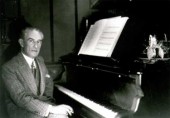SLIGHT PROBLEM WITH UPLOADING NEW MUSIC: I HAVE JUST MOVED INTO MY UNIVERSITY ABOUT TWO WEEKS AGO WHICH MEANS NATURALLY THAT I HAVEN'T BROUGHT EVERYTHING, INCLUDING MY CD COLLECTION AND COMPUTER. THIS MEANS I WILL EITHER HAVE TO JUST UPLOAD AS SOON AS I CAN (WHICH COULD BE A WHILE) OR I COULD TRANSFER MANAGEMENT OF THIS TRIBUTE PAGE TO SOMEONE ELSE. ANY VOLUNTEERS ARE WELCOMED, JUST MESSAGE ME AND I'LL GIVE IT THOUGHT.__________________________________[MANAGEMENT OF PAGE TRANSFERED TEMPORARILY AS OF NOW, THANKS TO ALL THOSE WHO HAVE VOLUNTEERED TO HELP OUT, VERY MUCH APPRECIATED.] _____________________________
Joseph Maurice Ravel, French composer, was born in 1875 in the Basque town of Ciboure, near Biarritz, as the son of a Swiss father (an inventor and industrialist) and a Basque mother. After the family moved to Paris, the 7-year-old Maurice started piano lessons, and he entered the Paris Conservatory in 1889, studying piano with Bériot, counterpoint with Gédalge, and composition with Gabriel Fauré. Ravel was not an especially precocious pupil; he remained at the Conservatory for 16 years, during which time he composed and hung about with a group of young avant-garde artists who called himself the Apaches. This illustre group included Leon-Paul Fargue, M.D. Calvocoressi, Paul Sordes, Maurice Delage, and the Catalan virtuoso Ricardo Viñes. Ravel dedicated each movement of his piano suite Miroirs to one of them.
From 1901 until 1905, he tried in vain to win the prestigious Prix de Rome for composition, and was eventually forbidden to try it once more. The ensuing scandal lead to the resignation of the conservatory director Dubois (who was succeeded by Fauré), and Ravel leaving the conservatory. By this time, he had already found a distinctly personal style of composition, based on classical values but being frowned upon in academic circles because of its often unusual harmonies.
During the first World War, Ravel was denied active army service because of his age and frail health, but he nevertheless served his country as an ambulance driver. In 1920, the French government awarded him with the Legion d'honneur, which he declined. In 1928 he met with great acclaim during a piano tour of the United States of America, where he met George Gershwin, and was awarded a honorary doctorate by the Oxford University. In 1932 Ravel suffered a car accident from which he never fully recovered, and his output dropped dramatically. He died in 1937 after an unsuccesful operation on a brain tumour, and was buried in Levallois Perret in western Paris.
